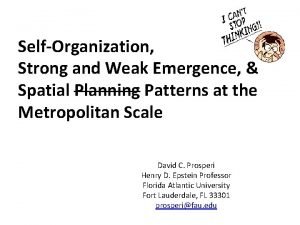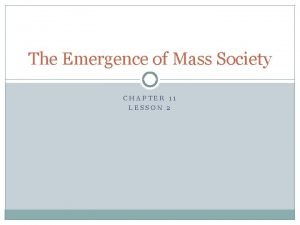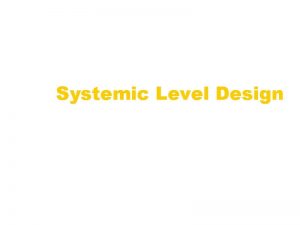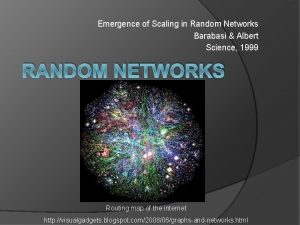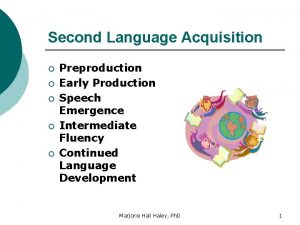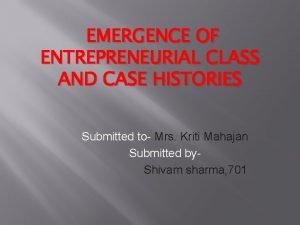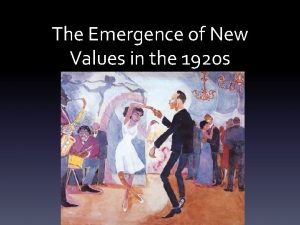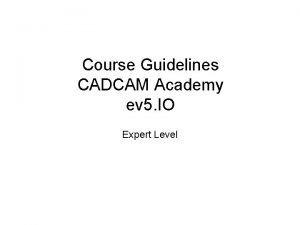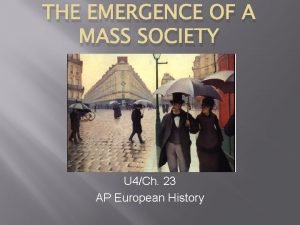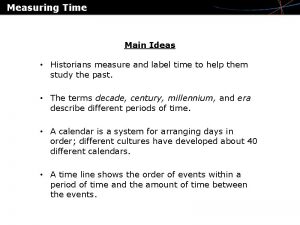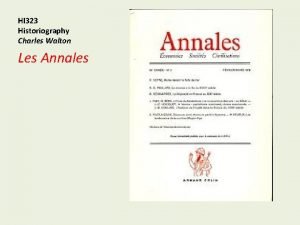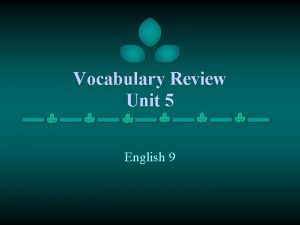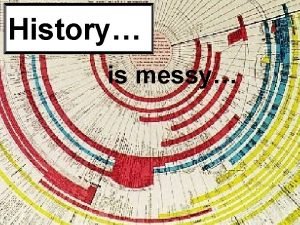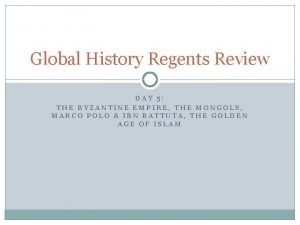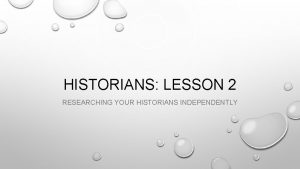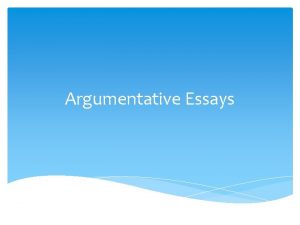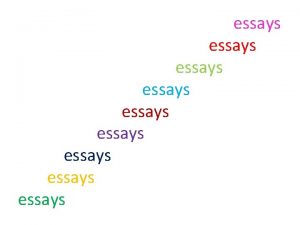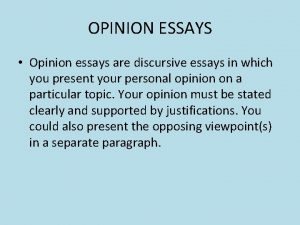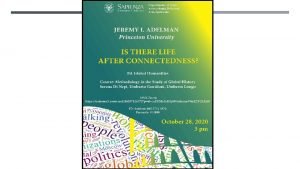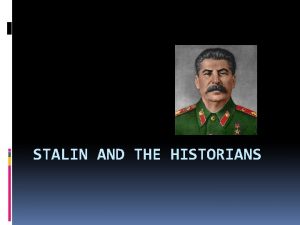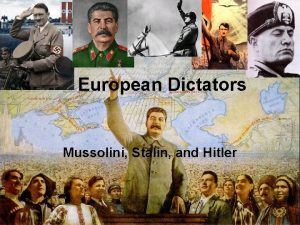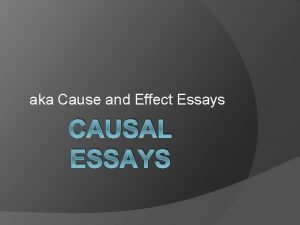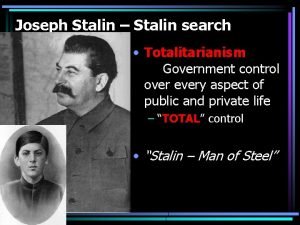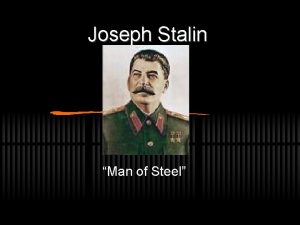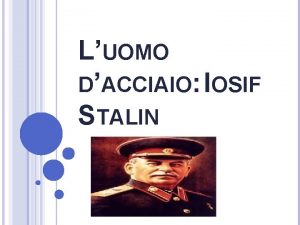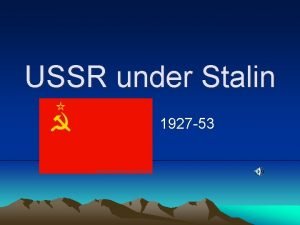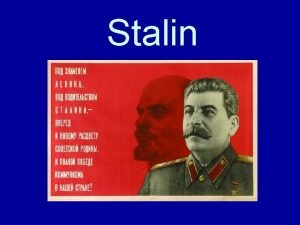STALIN AND THE HISTORIANS Stalin essays Emergence of



![[Russia] has also gained a glorious history. Films and television programmes continually drive home [Russia] has also gained a glorious history. Films and television programmes continually drive home](https://slidetodoc.com/presentation_image_h/02f0b6ad3d79e0deb9b3e8d2fa619c67/image-4.jpg)


















- Slides: 22

STALIN AND THE HISTORIANS

Stalin essays Emergence of authoritarian states (why can’t Stalin be used? ) Rise, Consolidation and maintenance of power: Methods: legal, use of force, charisma, propaganda Opposition Foreign Policy Aims and Results of policies: Economic, political, cultural, social Impact of policies on women and minorities Authoritarian control – extent achieved?

Why is the historical debate important? From the IB essay rubric, 13 – 15 points: There is an evaluation of different perspectives, and this evaluation is integrated effectively into the answer. N. B: Different Perspectives can be provided by contemporary sources as well as the work of historians
![Russia has also gained a glorious history Films and television programmes continually drive home [Russia] has also gained a glorious history. Films and television programmes continually drive home](https://slidetodoc.com/presentation_image_h/02f0b6ad3d79e0deb9b3e8d2fa619c67/image-4.jpg)
[Russia] has also gained a glorious history. Films and television programmes continually drive home the message that Russia is a great nation with a unique destiny. Some of Mr. Putin's ideological advisers believe Russians have spent far too much time being ashamed of their past. For example, a new manual for history teachers in Russian high schools now states that Joseph Stalin was "the most successful Soviet leader ever". As for the purges, which killed millions, they are dismissed as a necessary evil. Mr. Putin, himself, recently said they weren't as bad as atrocities perpetrated by other nations. BBC News, 25 th February 2008

State Media’s Failure to Denounce Stalin Criticized 27 October 2011 Moscow News State-controlled media must stop whitewashing Soviet dictator Josef Stalin's image, and the government should take a stand on his crimes, human rights activists and historians said Wednesday. State-run television stations have recently turned Stalin's name into a favorable brand, thanks to a "very talentedly executed propaganda, " Alexander Drozdov, director of the Boris Yeltsin Center, said at a news conference. Nationwide, the television stations have aired many movies and programs casting Stalin in a positive light. He was voted as Russia's third-greatest historical figure in a prime-time show in 2008, garnering more than 519, 000 votes. Recent polls have shown that one-third to one-half of Russians have a decidedly or at least a mildly positive view of Stalin.

http: //www. reuters. com/article/2008/12/28/us-russia-stalin-id. USTRE 4 BR 17620081228

The Debate: How effective was Stalin? Theory #1: Method → Result • Stalin was ruthless in pursuit of power and efficient in its use • Stalin in full control of USSR • Industrial infrastructure developed through planning • Opposition cut down by purges • Foreign policy, despite practical changes had an overall strategy. (HL only, we will do this later on)

The Debate: How effective was Stalin? Theory #1: Method → Result Because of these factors the USSR, despite the suffering, was able to defeat Nazi Germany. Mostly pre 1991 historians: Stalin developed & controlled a system that worked. Issue for dispute: the ‘cost’ of the system

The Debate: How effective was Stalin? Theory #2: Flawed Totalitarianism • Stalin sought to centralise a system which kept falling to local initiatives • Foreign policy continually corrected – errors in judgment, as well as events • War with Germany paralysed system and victory came from transcending Stalinism

The Debate: How effective was Stalin? Theory #2: Flawed Totalitarianism The system didn’t necessarily work, and Stalin wasn’t necessarily in control. Mostly post 1991 historians: Issue for dispute: Destalinization vs. Stalinism revived

The Issues for historians • Access to material: storage, access, glasnost • Work of émigrés & defectors • Westerners who visited USSR were often sympathetic to communism • Trotsky’s prolific output and seemingly authorative work • Cold War • Literature, eg: Solzhenitsyn

World War II The ‘testing’ of the regime during World War II Stephen J. Lee (Europe of the Dictators) claims that Stalin ‘unpicks’ his systems in the face of emergency, became less dogmatic and therefore able to win the war. (e. g: religion) Alan Bullock (Parallel Lives): achievement of the Russian people on the economic front under the Soviet system and Stalin’s leadership – despite Stalin’s dismal record as a war commander

Ian Grey Stalin: Man of History (1979) Most staunch Western defender of Stalin • • Believed historians have been overly influenced by Trotsky “Soviet Russia became stronger as a result of Stalin’s campaigns of industrialisation, collectivisation and social transformation. ”

Martin Mc. Cauley Stalin & Stalinism (2003) • Senior lecturer in politics of Eastern Europe at University of London • Widely published: academic books as well as textbooks • Stalin – brutal, appalling methods but achievement considerable • Industrialisation in particular meant victory over the Nazis & that USSR became one of the two superpowers after 1945.

Martin Mc. Cauley Stalin & Stalinism (2003) “The Stalin revolution revitalised the country. ” “[Stalin] launched a violent, phenomenally ambitious modernisation of the coutnry. ” “[Stalinism] was phenomenally successful and eventually a crashing failure. ”

E. H. Carr A History of the Soviet Union (14 volumes 1950 -1978) • A traditional Marxist perspective • Cambridge University, assigned to Latvia while working for UK foreign office in 1920 s • Economical & political forces shaped Stalin, but Stalin still a strong figure. • Stalin as an ‘agent of history’: produced by the circumstances after the Bolshevik Revolution • If Stalin had not industrialised Russia, then someone else would have done so.

E. H. Carr A History of the Soviet Union (14 volumes 1950 -1978) • Stalin combined immense achievements with utter brutality: “an emancipator and a tyrant. ” • Stalin was “the great executor of revolutionary policy. ”

Richard Pipes has written many books on Russian history, including Russia under the Old Regime (1974), The Russian Revolution (1990) and Russia Under the Bolshevik Regime (1994), and has been a frequent and prominent interviewee in the press on the matters of Soviet history and foreign affairs

Richard Pipes • the origins of the Soviet Union can be traced to the separate path taken by 15 th century Muscovy • Muscovy differed from every state in Europe in that there was no concept of private property : everything was regarded as the property of the Tsar. • this separate path undertaken ensured that Russia would always be an autocratic state with values fundamentally dissimilar to the values of Western civilization. • Russia uniquely open to what Pipes sees as a communist hijacking in 1917. Stalin, therefore, was a continuation of the traditions of Russian history that had existed for 500 years.

Richard Pipes has argued that the Soviet Union was an expansionist, totalitarian state bent on world conquest.

Adam Ulam Stalin: The Man and his Era (1987) • Professor of History and Political Science at Harvard • USSR would have been better off without Stalin, any regime could have industrialised Russia. • Stalin impeded Soviet victory in WWII, as the purges had liquidated Russian manpower and expertise.

Robert Conquest The Great Terror (2008) and lots, lots more… • Worked for UK foreign office, freelance historian • Former communist who became disillusioned after 1945 • Widened understanding of the Purges • Stalinism as a continuation of Leninism • His strong views opened up a huge debate: see Neal Ascherson & Ludo Martens
 Strong and weak emergence
Strong and weak emergence Emergence theory
Emergence theory Lesson 2 the emergence of mass society
Lesson 2 the emergence of mass society Systemic game design
Systemic game design Speech emergence examples
Speech emergence examples Emergence of scaling in random networks
Emergence of scaling in random networks Preproduction early production speech emergence
Preproduction early production speech emergence Plan emergence madagascar 2019-2023 pdf
Plan emergence madagascar 2019-2023 pdf Netflix core competencies
Netflix core competencies Entrepreneurship during post independence
Entrepreneurship during post independence The emergence of new values
The emergence of new values Plan emergence madagascar 2019-2023 pdf
Plan emergence madagascar 2019-2023 pdf Emergence profile
Emergence profile Landmarks in emergence of corporate governance
Landmarks in emergence of corporate governance The emergence of mass society
The emergence of mass society Timeline software for historians
Timeline software for historians Eras in texas history
Eras in texas history Annales historians
Annales historians Most historians agree that military disasters
Most historians agree that military disasters Why do historians organize history chronologically?
Why do historians organize history chronologically? Which title best completes this graphic organizer? *
Which title best completes this graphic organizer? * Until lions have their historians
Until lions have their historians What do historians call the early period of human history
What do historians call the early period of human history
